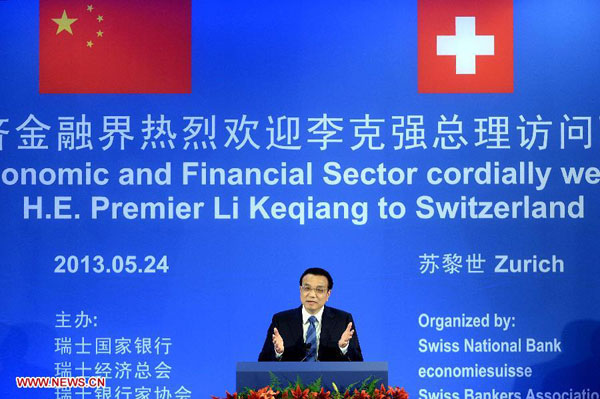Successful FTA talks vitalize Sino-Swiss co-op
 0 Comment(s)
0 Comment(s) Print
Print E-mail Xinhua, May 25, 2013
E-mail Xinhua, May 25, 2013
The successful negotiations over a free trade agreement (FTA) between China and Switzerland will inject new and strong vigor into the two countries' further cooperation, visiting Chinese Premier Li Keqiang said?in Zurich?Friday.
|
|
| Chinese Premier Li Keqiang gives a speech at a luncheon with business and financial leaders in Zurich, Switzerland, May 24, 2013. [Li Tao/Xinhua] |
Addressing business and financial leaders at a luncheon, Li said the FTA deal would have wider implications, as Switzerland will be the first continental European country and the first among the world's 20 largest economies to sign a free trade pact with China.
The accord will not only help boost bilateral cooperation, but also benefit China-Europe relations and set an important example for other countries, Li added.
The Chinese premier said reaching the deal has not been easy, as both sides made tremendous efforts to seek common grounds while reserving differences in their nine rounds of talks over the past three years. "I believe the blueprint will surely come true," he said.
Li said the contents of the pact are extensive and high-level, covering not only trade in goods and services, but also environmental protection, labor and employment, intellectual property rights and market competition.
Both sides agreed to grant each other zero tariff or low-level tariff treatments for most of the goods from both sides and push forward the liberalization and facilitation of services trade, he said, hailing it as a mutually beneficial and win-win arrangement.
"The deal would not only cut transaction costs, encourage market competition, but also help market forces to play a fundamental role in resource allocation," said Li.
The premier said China will open up wider and speed up its free-trade-zone strategy.
China will join hands with its FTA partners to achieve more "openness bonus," unleash more "reform bonus" and share more "development bonus," he said.
China has been actively pushing forward the parallel development of multilateral trade systems and regional trade arrangements, holds an open attitude toward any cooperation that benefits the liberalization of trade and investment and regional economic integration, and opposes trade and investment protectionism in all forms, Li said.
China is highly concerned about the EU's anti-dumping and anti-subsidy probes on Chinese photovoltaic products and mobile telecom equipment, he said.
The two cases will not only cause severe damages to China's related industries, enterprises and jobs, but also harm the interests of European users and consumers, Li noted.
The measures will allow protectionism to have its way, Li said, adding China is therefore resolutely opposed to them.
He said China always favors solving trade disputes via dialogue and consultation.
China hopes the EU will properly handle the two cases, give thought to the overall China-EU economic and trade relations and uphold the principle of free trade, he added.
Li noted that Switzerland is an important international financial hub. China and Switzerland will establish a financial dialogue mechanism and boost cooperation in the financial sector.
"We will continue to deepen reform and opening-up in the financial sector and let openness drive reform, development, economic transformation and innovation, so as to realize the continuous and healthy development of China's economy and provide opportunities for world economic growth," Li said.
China supports stable international financial and economic policies that would help maintain global financial stability, stimulate market recovery and economic growth, he said.
China hopes that the international financial system will be improved and reformed to strengthen international financial supervision, encourage regional financial cooperation, and enhance the voice and representation of developing countries while maintaining the current reasonable and effective international economic mechanisms and rules, he said.
The Chinese premier, who is on his first trip abroad since taking office, spoke highly of Switzerland's diplomatic ties with China.
The Alpine nation was one of the first Western countries to recognize the New China, the first European country to recognize China's market economy status and would soon become the first continental European country to ink an FTA with China, Li said, adding he hopes China-Switzerland relations will continue to be enhanced.
About 300 business and financial leaders, including Swiss economics minister Johann Schneider-Ammann and Swiss National Bank Chairman Thomas Jordan, attended the luncheon.
In his address, Schneider-Ammann said China's development has vigorously promoted world economic development and that Switzerland and China have always maintained close economic ties.
The FTA between the two countries will bring bilateral economic and trade cooperation to a new phase, he said, adding Switzerland is ready to work with China to translate their agreement into tangible results at an early date.
Earlier on Friday, Li visited a farm in the suburb of Zurich.
He said China's modernization of its agriculture must learn from the successful experiences and models of other countries while taking into account its own reality.
"Switzerland has rich agricultural resources and advanced technologies, while China has a market with huge potential," said Li.
The two countries should step up exchanges and cooperation, and tap potentials to benefit the people of the two countries, he said.






